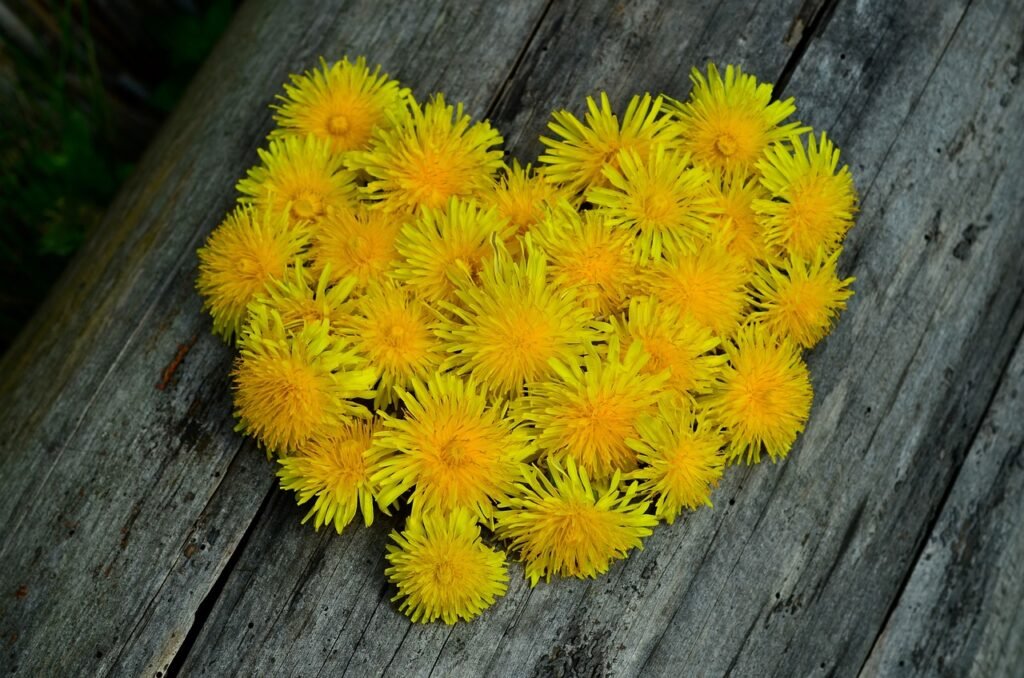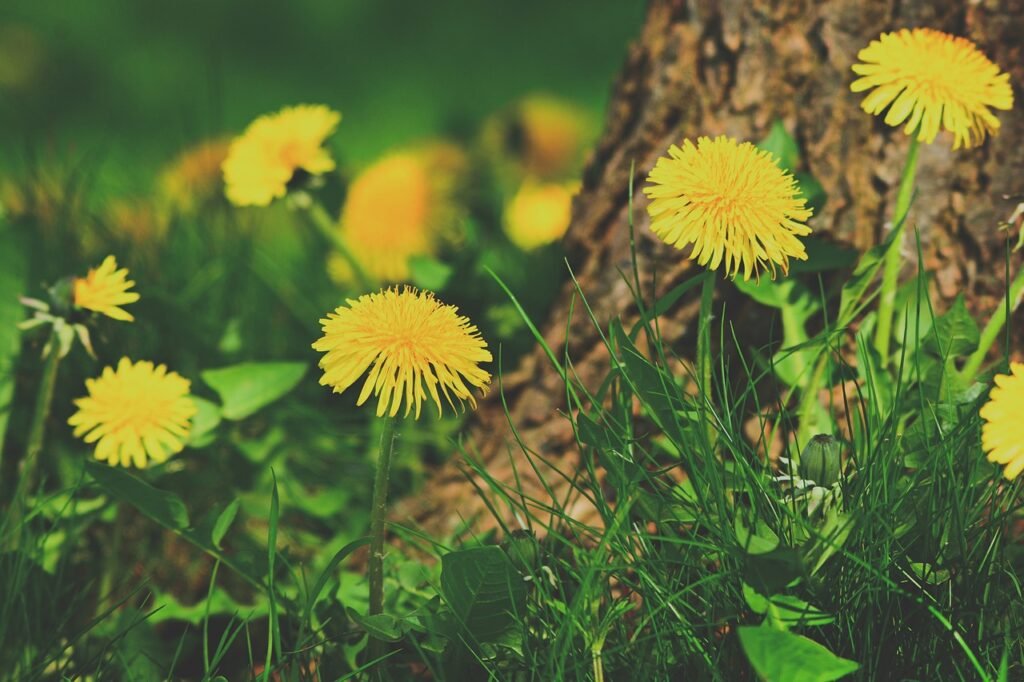This post may contain affiliate links. Which means I may receive a commission for purchases made through links, at no cost to you. I will only recommend products that I have personally used. Learn more on my Disclaimer Page and Privacy Policy Page

Dandelions offer a variety of health benefits, making them much more than just a pesky weed. Here are some of the notable health benefits associated with dandelions:
- Nutrient-Rich: Dandelion greens are packed with vitamins and minerals, including vitamins A, C, and K, as well as calcium, iron, and potassium. Incorporating dandelion greens into your diet can help meet your nutritional needs and support overall health.
- Liver Health: Dandelion root has long been used in traditional medicine to support liver health. It contains compounds that stimulate bile production and enhance liver detoxification, aiding in the removal of toxins from the body and promoting liver function.
- Digestive Aid: Dandelion is believed to have mild laxative effects and can help promote healthy digestion. It may stimulate appetite, improve bile production, and relieve symptoms of indigestion and constipation.
- Diuretic Properties: Dandelion has diuretic properties, meaning it can increase urine production and promote fluid balance in the body. This makes it useful for alleviating water retention, bloating, and symptoms of urinary tract infections.
- Antioxidant Activity: Dandelions are rich in antioxidants, such as beta-carotene and flavonoids, which help protect cells from damage caused by free radicals and oxidative stress. Consuming dandelions regularly may help reduce inflammation, lower the risk of chronic diseases, and support immune function.
- Blood Sugar Control: Some research suggests that dandelion may help regulate blood sugar levels and improve insulin sensitivity, making it potentially beneficial for individuals with diabetes or pre-diabetes.
- Skin Health: Dandelion extracts and oils are sometimes used in skincare products for their potential anti-inflammatory and antioxidant properties. They may help soothe irritated skin, reduce inflammation, and promote overall skin health.
Can I eat Dandelion? Sure Can!

- Dandelion Tea: You can make tea using dandelion leaves and/or roots. Dandelion tea is believed to have various health benefits and can be made by steeping dried or fresh dandelion leaves or roots in hot water.
- Dandelion Salad: Young dandelion leaves can be used in salads. They have a slightly bitter taste, similar to arugula or endive. Mix them with other greens and vegetables for a nutritious salad.
- Dandelion Wine: If you’re into homebrewing, you can try making dandelion wine. It involves fermenting dandelion flowers along with sugar, yeast, and other ingredients. There are many recipes available online for making dandelion wine.
- Dandelion Jelly: Dandelion jelly is a unique and tasty spread that you can make at home. It’s made by steeping dandelion flowers to make a flavorful infusion, which is then turned into jelly by adding sugar and pectin.
- Dandelion Pesto: Instead of using traditional basil, you can make pesto using dandelion greens. Blend dandelion greens with garlic, nuts (such as pine nuts or walnuts), olive oil, and Parmesan cheese to make a flavorful pesto sauce.
- Dandelion Syrup: Dandelion syrup is a sweet syrup made from dandelion flowers, sugar, and water. It can be used as a topping for pancakes, waffles, or ice cream, or added to drinks for flavor.
- Dandelion Fritters: Dip dandelion flowers in a batter made from flour, eggs, and milk, then fry them until golden brown to make dandelion fritters. They make a tasty and unique appetizer or snack.
- Dandelion Oil: Infuse dandelion flowers in oil (such as olive oil or coconut oil) to make dandelion-infused oil. This oil can be used for massage, skincare, or cooking

Dandelion has been traditionally used for various medicinal purposes, and it’s believed to offer several health benefits. Some parts of the body that dandelion may help include:
- Liver: Dandelion has historically been used to support liver health. It is believed to stimulate bile production and promote liver detoxification, which may aid in the digestion of fats and overall liver function.
- Digestive System: Dandelion may have a positive effect on digestion. It is thought to act as a mild laxative and diuretic, promoting bowel movements and urine production. This can help alleviate constipation and bloating.
- Kidneys: Due to its diuretic properties, dandelion may help support kidney function by increasing urine production and promoting the elimination of waste and excess water from the body. This could potentially benefit individuals with conditions like water retention or urinary tract infections.
- Skin: Some people believe that dandelion may benefit the skin when applied topically or consumed internally. It is sometimes used in herbal skincare products for its purported anti-inflammatory and antioxidant properties, which may help soothe irritated skin and protect against free radical damage.
- Immune System: Dandelion contains various nutrients, including vitamins A and C, which are essential for maintaining a healthy immune system. Consuming dandelion as part of a balanced diet may contribute to overall immune health.
- Blood Sugar Levels: Some research suggests that dandelion may help regulate blood sugar levels, which could be beneficial for individuals with diabetes or those at risk of developing the condition. However, more studies are needed to confirm its effectiveness for this purpose.
- Cholesterol Levels: There is some evidence to suggest that dandelion may help lower cholesterol levels, although more research is needed to fully understand its effects on lipid metabolism and cardiovascular health.
Dandelion earns its remarkable status through a convergence of attributes that make it truly extraordinary. First and foremost, its nutritional potency is awe-inspiring. Bursting with vitamins A, C, and K, alongside essential minerals such as iron, calcium, and potassium, dandelion leaves offer a powerhouse of health benefits. Whether incorporated into salads, stir-fries, or teas, dandelion’s versatile edibility ensures its accessibility as a nutrient-rich food source. Moreover, its medicinal prowess has been revered across centuries and cultures. From promoting liver detoxification and aiding digestion to bolstering kidney function and exhibiting anti-inflammatory properties, dandelion emerges as a multifaceted herbal remedy for a plethora of ailments, resonating with both traditional wisdom and modern scientific inquiry.
Furthermore, dandelion’s ecological resilience and sustainability underscore its marvel. Flourishing in diverse ecosystems, from lush meadows to urban landscapes, dandelion demonstrates an unparalleled adaptability and capacity to thrive in even the most challenging conditions. Its prolific growth and deep taproots not only contribute to soil health and stability but also serve as vital early-season nectar sources for pollinators, supporting biodiversity and ecosystem resilience. Beyond its ecological contributions, dandelion embodies a rich tapestry of cultural significance, symbolizing resilience, hope, and the cyclical rhythms of nature. From ancient folklore to contemporary art, dandelion’s ubiquitous presence resonates with humanity’s collective imagination, reminding us of the intrinsic beauty and vitality of the natural world. In essence, dandelion’s amalgamation of nutritional, medicinal, ecological, and cultural virtues renders it truly amazing and deserving of admiration.

